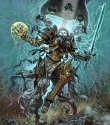|
WOW check this out, it's the only known cylinder-recording discovered to be that of none of than Otto Von Bismark, founder of modern germany:- Bismark Recorded. And there's even one for Helmuth Von Moltke! My heart jumped up as it loaded, it's just incredible that we're hearing the voice of the man who essentially founded modern Germany as we know it. Imagine, this is the voice napoleon the third heard when he surrendered! Speaking of which, I have always wondered about what drove napoleon the third to think he'd win in a fight against the prussians, given that they just kicked Austria's rear end just prior.
|
|
|
|

|
| # ? May 5, 2024 16:15 |
|
Rabhadh posted:Christ so when poo poo started going badly, the only thing an individual sailor could do was run and find that one officer with the right training? Boggles the mind. No, I mean they knew to grab hoses and start pouring water on stuff that's on fire, but there was nobody with any complex understanding of the strategy of damage control.
|
|
|
|
Alchenar posted:John Churchill's march to Blenheim in 1704 was noted specifically for the fact that he provided gold to his soldiers to purchase everything they needed from the villages and farms they passed on their march, avoiding looting and alienating the population. This was considered very unusual at the time. I'm surprised this worked. In a city gold can buy food at a fairly constant price, but out in rural areas there is a cap on supply, since people won't sell food that they need for sustenance unless they know they will be able to buy more. Unless you are marching across very productive agricultural land or have a relatively small army I doubt the 'spare' supply of food will be enough. If there is a significant market economy for food, the farmers may sell to the soldiers anyway, but in that case the non-farming local population will be unable to afford it, which leads to massive riots and civil breakdown.
|
|
|
|
wdarkk posted:Granted, Japanese damage control was terrible so some of those carriers could have made it if it wasn't. Taiho in particular was a freak damage control failure, and you also have things like IJN Akagi (carrier) going down to a single bomb hit. Dick Best landed one of the best bomb hits of the war on Akagi. His bomb landed just feet aft of the midships elevator, right amongst the torpedo squadron being spotted. It also appears that the blast dropped the elevator down the shaft, crushing the CO2 firefighting gear and probably trapping burning debris under the elevator. One of the other two bombs landed close inboard - close meaning under the flight deck overhang - and wrecked the port propeller and the aft magazine flooding system. The steering damage alone would have taken the Akagi out of the fight and might have forced her to scuttle if emergency repairs couldn't be conducted.
|
|
|
|
Al-Saqr posted:WOW check this out, it's the only known cylinder-recording discovered to be that of none of than Otto Von Bismark, founder of modern germany:- Made even funnier because everyone always thought Bismarck had a very high and annoying voice. He sounds pretty much like I thought a guy of his stature would sound. Also check out his mad poetry skillz. As for Napoleon III and the franco-prussian war, it is a bit of a story. France, for example, had gone to war against Austria to help their Italian allies unite Italy. There, they had barely managed to beat the Austrians, and were accordingly pissed that those loving Prussians with their breech-loaded rifles and their fancy railways had beaten Austria so handily. "Revenge for Sadowa" was a major thing for the French officer corps, Sadowa being the battle formerly known as Second, the alliances between the southern German States and the Northern German Federation (aka Prussia and a few minor German states) were secret and came into effect only when France attacked, which they did. One can only imagine how smug Bismarck must have looked when he got the news about the French declaration of war. Napoleon III assumed that he would only have to fight the NGF, which probably helped in making that mistake. Lastly, Napoleon III wasn't the Emperor of France, he was the Emperor of the French, which meant that public opinion was a big factor in his decisions. You can pretty much look at his entire foreign policy and see a constant theme: poo poo not working at home, start something abroad to harness patriotic feelings and unite the country behind its leader. There were crowds running through Paris yelling "Á Berlin!" before the declaration of war.
|
|
|
|
Rabhadh posted:Christ so when poo poo started going badly, the only thing an individual sailor could do was run and find that one officer with the right training? Boggles the mind. I will quote from Shattered Sword on the differences between IJN and USN damage control - page 277 for those with their own copies who want to read along: quote:While a detailed comparative study of Japanese and American damage-control practices is beyond the scope of this work, some pertinent points can quickly be made. First, the total number of damage-control personnel on board a Japanese vessel was drastically lower than on a comparable US warship. Whereas in 1942 a US carrier could effectively number almost every one of its non-aviation staff as being able to contribute to damage-control effort in some capacity, a Japanese carrier might only have between 350 and 400 men trained out of a crew of 1,500-2,000. Obviously in other sections of the book they go into detail with each carrier and discuss the particular failings in damage control that went on in each case - badly designed fire-fighting foam dispersal systems that were too easily damaged, fire control screens in the hangers not being used, too much ordnance sitting around in the hangers, aviation gas still in the fuel hoses, no way to disperse gas vapors, etc etc etc. Kaga and Soryu took enough damage that once the bombs hit, there was probably no damage control team in the world that could have saved them. Akagi is questionable. Taiho is the ultimate "whoops" of IJN damage control.
|
|
|
|
Taiho - otherwise known as "How to turn your vessel into a massive floating Fuel-Air bomb"
|
|
|
|
Saint Celestine posted:Taiho - otherwise known as "How to turn your vessel into a massive floating Fuel-Air bomb" I just wiki'd that and holy poo poo-- "Hmm... our hangar is filling with aviation fuel fumes. Aviation fuel is highly flammable. Let's vent the fumes into the rest of the ship's ventilation system! That can't possibly go wrong."
|
|
|
|
Jesus Christ. While the Germans lost soundly they always seemed to have *a bit* of concern about the state of their troops. Looking at the Japanese, from the airplanes to the ships to the tanks and to the infantry weapons you get the idea of an army that was nowhere near prepared to plan a defensive war, let alone conquer the Pacific.
|
|
|
|
What does it say about everyone else in the region, though? I mean until the Chinese resistance really heated up and the Allies got involved the Japanese conquered the poo poo out of southeast Asia. Someone brighter than me said that it was like 'watching 1939 Italy conquer a hemisphere.'
|
|
|
|
I guess from a purely military perspective it speaks well for the japanese men (and women?) who made those victories happen while being gimped with their lovely weapons.
|
|
|
|
The thing is that to all appearances their doctrine was a decade or two out of date; I think it just speaks poorly of everyone else. e: To expand on that with the only example I can think of off the top of my head, let's take China. When the Japanese manufactured their casus belli (the Marco Polo Bridge Incident in 1937) the nation of China had a military that was equal to or larger than the IJA, but totally un-mechanized and very poorly trained and led. They broke and ran at Beijing and basically didn't stop until they got to Nanjing, where they held a little while and pissed off the Japanese enough to initiate the infamous Rape of Nanking before they broke and ran again. At this point, the semi-legitimate government (sort-of-democratically elected, but then taken over by Chiang Kai Shek) fled into the hinterland and basically stayed as far from the Japanese as possible while avoiding battle. The basic KMT strategy was to wait for the Japanese to give up or be defeated by someone else so that the KMT military could fight Mao's communists after the war. The communists, on the other hand, actually fought the Japanese, although they were outlawed by the KMT and not supported much by the soviets who were busy with a confrontation with Japan until 1940 and then an unexpected German invasion in '41. edit 2: A lot of this could be wrong, but please correct me; I like being corrected. Grand Prize Winner fucked around with this message at 22:14 on Feb 2, 2012 |
|
|
|
Grand Prize Winner posted:What does it say about everyone else in the region, though? I mean until the Chinese resistance really heated up and the Allies got involved the Japanese conquered the poo poo out of southeast Asia. Japan's naval offensive power in 1941, and particularly their naval air arm, was unmatched by any Navy in the world. No other force until the US Big Blue Fleet of 1944 could have pulled off the Pearl Harbor attack. They had superior planes, piloted by some of the best pilots in the world, and organized their offensive aerial strikes with a genius and revolutionary coordination system. Their operational doctrine and strategic thought were fatally flawed, but that didn't stop them from organizing a masterful offensive with Kido Butai from December 7 up until Coral Sea. They put so much effort into making their forces as offensively powerful as possible, they never thought much about how they would defend themselves when the other guy shot back.
|
|
|
|
Comrade_Robot posted:The answer is: it depends. With the caveat that some of these were probably overkill: Need to remember that not all torpedoes are created equal. Air-dropped torpedoes don't have nearly the punch that surface ship and sub torpedoes have. Re Japanese strategy, it always seems to be like they planned backwards. They didn't assess enemy resources and intentions and them devise methods for winning; they assumed that they would win and reasoned backward from that.
|
|
|
|
Grand Prize Winner posted:What does it say about everyone else in the region, though? I mean until the Chinese resistance really heated up and the Allies got involved the Japanese conquered the poo poo out of southeast Asia. Uh, I presume you mean until America got involved. The southeast Asia you're talking about was mostly owned by Britain at the time, which basically got owned because all their best troops/equipment/ships were fighting Germans over in Europe and Africa (not that Zeros versus Swordfish would have been a good time even if that hadn't been the case, mind you).
|
|
|
|
feedmegin posted:Uh, I presume you mean until America got involved. The southeast Asia you're talking about was mostly owned by Britain at the time, which basically got owned because all their best troops/equipment/ships were fighting Germans over in Europe and Africa (not that Zeros versus Swordfish would have been a good time even if that hadn't been the case, mind you). That's not really true at all. Singapore was a significant port and Burma was a country, but the Dutch East Indies were Dutch and the Phillipines were a US colony. China was Chinese and the Indonesians neutrality pacted Japan to save themselves.
|
|
|
|
The British were absolutely horrified when Singapore fell and the entire garrison surrendered. Something like 80,000 British and colonial troops were captured in Singapore alone. It was extremely embarrassing for them, especially since they considered it a second Gibraltar or something.
|
|
|
|
Grand Prize Winner posted:edit 2: A lot of this could be wrong, but please correct me; I like being corrected. Well, the thing that kept the KMT from totally collapsing was that the Japanese army was smaller and not much better in terms of equipment. They really had no capacity to exploit any breakthroughs or really actually seal in encircled groups. The KMT didn't really go into hibernation until US entry into the war, and the CCP was not very active in conventional fighting, either. Chiang blew most of the best of his army(products of the German Military mission) in a defense of Shanghai, trying to impress the other great powers into intervention by fighting near the foreign concessions. Unfortunately, this didn't work, and only the poorer troops remained. In the period between 1938 and 1941, the KMT found a new patron in Stalin, who sent material and expertise, which funded some of the offensives of that period. Since the Japanese army really didn't have enough troops to defend its front effectively, the KMT was able to attack and retake areas that the Japanese were relatively willing to give up. One of the interesting things is that in December 1941, China would score its last major land victory of the war in Changsha, where they were able to lure Japanese troops into a trap.
|
|
|
|
Zorak of Michigan posted:Re Japanese strategy, it always seems to be like they planned backwards. They didn't assess enemy resources and intentions and them devise methods for winning; they assumed that they would win and reasoned backward from that. I heard the Japanese expected America to essentially cede the Pacific after Pearl Harbor. They thought that democracy had weakened the American martial spirit so a decisive blow would be sufficient. They recognized they would lose a long war because they would be outproduced. But when the decisive blow had the unintended effect of riling up the Americans, Japan's own martial culture would not let it surrender despite being faced with a losing proposition. I'd be curious if anyone has any good references to support or deny that view. Alchenar posted:Singapore was a significant port and Burma was a country, but the Dutch East Indies were Dutch and the Phillipines were a US colony. China was Chinese and the Indonesians neutrality pacted Japan to save themselves. To add to your list: the French had Vietnam.
|
|
|
Flippycunt posted:The British were absolutely horrified when Singapore fell and the entire garrison surrendered. Something like 80,000 British and colonial troops were captured in Singapore alone. It was extremely embarrassing for them, especially since they considered it a second Gibraltar or something. The guy that wrote 'To Rule the Waves' went so far as to suggest that the fall of the Singapore garrison had repercussions across the colonized world. I disagree with his thesis(and I don't think it's a popular thesis) but the fall of Singapore did help destroy the image of the invulnerable/superior white man that formed part of the basis of colonial rule.
|
|
|
|
|
The crazy thing about it is that the garrison at Singapore only surrendered because they greatly overestimated the capability of the Japanese force they faced. They would have held out if they actually fought.
|
|
|
|
Didn't the japanese capture the only fresh water supply to the island early in the battle? Something like that while fighting in south east asia is really gonna nudge you towards the surrendering option
|
|
|
|
Shimrra Jamaane posted:The crazy thing about it is that the garrison at Singapore only surrendered because they greatly overestimated the capability of the Japanese force they faced. They would have held out if they actually fought. That's not really true. The city's defences were aligned towards the sea so alot of the numbers that get thrown up about guns available are misleading. There was also no prospect of the Garrison beating back the Japanese or any prospect of lifting the siege so the city was lost anyway. The fall of Singapore itself probably didn't have major repercussions, but the fall of every colonial possession in SE Asia certainly did.
|
|
|
|
gohuskies posted:and organized their offensive aerial strikes with a genius and revolutionary coordination system. Their operational doctrine and strategic thought were fatally flawed, All their doctrine was fatally flawed, generally on the defensive side but their search doctrine was crap and that heavily impacted offensive operations. Making the air complement of a carrier organic instead of training air groups separately crippled their ability to recover from damage or losses. Surprisingly, their strike plans weren't well coordinated. Zimm's book on Pearl Harbor is an operational analysis and he finds a wide array of planning and coordinate problems with the attack. It's to Pearl Harbor as Shatered Sword is to Midway.  on Kindle on Kindlehttp://www.amazon.com/Attack-Pearl-Harbor-Strategy-Deceptions/dp/161200010X Notable issues with the PH strike are: Attack routes were conficted, planes would make their attack while evading other groups that had already attacked. The conger air plan was bullshit, the very first target to be hit wasn't a fighter base, but a seaplane base. This helped pursuit planes get in the air and could have resulted in the entire defensive force getting in the air and going for the bombers Exactly no fighters were allocated as escorts. As it turned out, this didn't hurt them but an alerted defense would have had a free run at the bombers. Fuchida hosed up his coordination signal on the way in. The whole plan was designed for an unalerted defense. No real provision was made for any defensive effort at all. If they'd tried that the weekend before against a defense on alert they'd have gotten chopped up. He also runs the numbers and decides a third strike against fuel tank farms and other installations wasn't worth the likely cost.
|
|
|
|
mllaneza posted:Pearl Harbor So essentially Pearl Harbor was a massive gamble that normally wouldn't have worked out well for the Japanese, but it caught the Americans off guard to have its devastating effect? That seems true of many Axis victories in the war.
|
|
|
|
Chamale posted:So essentially Pearl Harbor was a massive gamble that normally wouldn't have worked out well for the Japanese, but it caught the Americans off guard to have its devastating effect? That seems true of many Axis victories in the war. Pretty much.
|
|
|
|
mllaneza posted:All their doctrine was fatally flawed, generally on the defensive side but their search doctrine was crap and that heavily impacted offensive operations. Making the air complement of a carrier organic instead of training air groups separately crippled their ability to recover from damage or losses. You'll find 100% agreement from me on your assessment of their CAP and search doctrines. What I call "genius and revolutionary" is their use of multiple flight decks together, and putting together air groups from different decks into the same strike package. When US carriers launched a strike, each carrier would be responsible for putting together its own strike package and sending that package to the target itself. Even with warming up engines below-decks, this launching operation took a while, and the planes launched first would have to circle overhead waiting for the later planes to get launched, wasting time and fuel. Carriers would then send their own air groups to the target separate from each other, and they would arrive with poor coordination. The IJN, by contrast, used planes from multiple carriers to put together their strike packages. They could use fighters from this carrier, kanko from this carrier, kanbaku from this carrier, meaning that they could put a larger strike into the air faster, and then by combining planes from multiple carriers they would hit the enemy with more planes in a more coordinated fashion. (Obviously this didn't happen on Midway morning, but that was because Allied planes throughout the morning kept the CAP busy and forced them to use their flight decks to recycle the CAP and receive Tomonaga's strike.) The use of the CarDiv as opposed to the carrier as the basic operating unit of naval air power and centralizing command of all of KB's planes under a single officer was unique and revolutionary. The Pearl Harbor attack was not perfect, certainly - few attacks are - but no Navy in the world except the IJN had the ability to do such an attack until the USN hit its peak in late 1944. No other Navy in the world at the time even imagined the ability to do such a coordinated carrier air attack. They deserve recognition for that. Edit: Sunburst - The Rise of Japanese Naval Air Power, 1909-1941 by Mark Peattie is a great source on the development of First Air Fleet and the men, planes, and doctrine that made it up. gohuskies fucked around with this message at 04:03 on Feb 3, 2012 |
|
|
|
Chamale posted:So essentially Pearl Harbor was a massive gamble that normally wouldn't have worked out well for the Japanese, but it caught the Americans off guard to have its devastating effect? That seems true of many Axis victories in the war. It wasn't even all that devastating from a certain point-of-view. All they hurt were battleships and the carriers were left intact, which were much more important in the long run. This is delving into alt-history territory, but I recall reading an essay that suggested an intact US battleship fleet might have encouraged the US to sally forth with them, perhaps even to try and save the Philippines, but with terrible results. If I'm not mistaken, these battleships were relatively old and slow and would have been easy pickings for the KB, if not the IJN surface fleet itself, so they would have gone right into the "decisive battle" that the Japanese so lusted for.
|
|
|
|
You can contrive many different scenarios, but the Japanese superiority in torpedoes would have been a fairly brutal shock, and cost a lot of American lives. Anything sunk would be lost in deep water far from home, so there would be no hope of salvage. Absent the training the USN air crew got in the raids of early '42, I'd also expect a lot of the people who turned out to be the great leaders of later carrier air groups might get killed before they got their tactics ironed out. With or without battleships, the USN would benefit from testing its doctrine in skirmishes and raids before a major fleet action.
|
|
|
|
Zorak of Michigan posted:Anything sunk would be lost in deep water far from home, so there would be no hope of salvage. Or, perhaps more importantly, rescue. All those Americans either drowned or forced into Japanese captivity would have had a huge impact on home-front morale, but would it have been a war-ender or would the public have just gotten even more riled than they already were after Pearl? God, it would make an interesting scenario if the carriers were docked and the battleships were on maneuvers.
|
|
|
|
Saint Celestine posted:Taiho - otherwise known as "How to turn your vessel into a massive floating Fuel-Air bomb" I find it truly amusing that according to Wikipedia at least the name translates to "Great Phoenix". One would think naming a ship after a creature that routinely burns itself to death would be considered a terribly bad idea (or maybe it's an over-simplified translation I suppose). Grand Prize Winned posted:Or, perhaps more importantly, rescue. All those Americans either drowned or forced into Japanese captivity would have had a huge impact on home-front morale, but would it have been a war-ender or would the public have just gotten even more riled than they already were after Pearl? I'm not sure what kind of victory (if any) by Japan could have ended the war. Honestly the Japanese were criminally stupid for assuming that they could ever somehow make the USA "back off" by attacking them. Forget the obvious public enragement, even from a coldly logical perspective no nation could ever afford to let another nation attack like that and get away with it. Even if the Japanese had managed to totally succeed with crushing the USA fleet at Pearl Harbor about the best they could do is force the USA to spend time building up again before coming for bloody vengeance. If they had just hit the Phillipines or other US territories in the Pacific maybe they could have managed a "it's not worth it any more" response out of the USA eventually, but an unprovoked attack against home territory with that many casualties pretty much demanded any sane nation-state try its damndest to crush Japan utterly. Japan managed to commit the basic blunder of hurting an enemy enough to enrage him without being able to kill him outright. They could have made the war take longer, but I can't see any lasting peace with the US ever happening without effectively destroying the US, something Japan never had the capacity to do.
|
|
|
|
Japan did well against Russia in 1904-05. That too started with a surprise attack on the enemy naval base, and the fleet sent from Europe was destroyed due to Russian incompetence. All these news of defeat to the "Asian monkeys" resulted in major riots and uprisings in Russia. Add to this racism and contempt for democracy and I can understand how some could have assumed that that kind of humiliation in Pearl Harbor and Philippines should have caused the US morale to buckle and FDR to step down. Japanese exceptionalism!
|
|
|
MadDogMike posted:I'm not sure what kind of victory (if any) by Japan could have ended the war. Honestly the Japanese were criminally stupid for assuming that they could ever somehow make the USA "back off" by attacking them. Forget the obvious public enragement, even from a coldly logical perspective no nation could ever afford to let another nation attack like that and get away with it. Even if the Japanese had managed to totally succeed with crushing the USA fleet at Pearl Harbor about the best they could do is force the USA to spend time building up again before coming for bloody vengeance. If they had just hit the Phillipines or other US territories in the Pacific maybe they could have managed a "it's not worth it any more" response out of the USA eventually, but an unprovoked attack against home territory with that many casualties pretty much demanded any sane nation-state try its damndest to crush Japan utterly. Japan managed to commit the basic blunder of hurting an enemy enough to enrage him without being able to kill him outright. They could have made the war take longer, but I can't see any lasting peace with the US ever happening without effectively destroying the US, something Japan never had the capacity to do. The reason they thought they could get away with it was because they HAD. The Russo-Japanese War of 1904-05 started pretty much the same way, with a surprise attack on the Russian Far East Fleet at Port Arthur. It concluded, on the naval side anyway, with the Battle of Tsushima where the Russian fleet was pretty much annihilated. On the ground side, at the Battle of Mukden, the Japanese pushed the Russians hard and when the crunch came, the Russians broke in disorder. Those two "decisive battles" brought the Russians to the negotiating table where the Japanese got pretty much everything they wanted. So the lesson they learned, which was reinforced in World War I where the Japanese were able to grab some German holdings in the Pacific on the cheap, was that you start a war with a surprise attack, then you maneuver to get a decisive battle where you destroy the enemy fleet in its entirety, combined with rapid ground assaults against limited targets. This will bring the feeble western power to their knees where they will give you whatever you ask for rather than keep fighting. The problem, of course, was that it completely misread the differences between Imperial Russia in 1904 and the United States in 1941. Not only did they not understand what their attack would do vis a vis enraging the American population, they also never realized until it was far too late the degree to which they were outclassed industrially. Remember, the Japanese Fleet in 1941 was both larger* and more modern than the American one. The idea that the United States, mired in economic woes, could not only completely rebuild its fleet but do so many times over just wasn't something they could believe. So the Japanese spent the entire war looking for the next Tsushima. That was what Midway was supposed to be, as was Philippine Sea, and especially Leyte Gulf. Each was the battle that was going to finally drive the Americans to the negotiating table. But, of course, that was never going to happen. Even if the Japanese had done to the Americans what was done to them at Midway, it wouldn't have changed the fact that the US could replace every ship they had at Midway ten times over by the time the war was done, where-as the Japanese could barely replace their own combat losses. Those who do not learn from history are doomed to repeat it, they say. The tragedy of Imperial Japan is that they tried too hard to repeat history and didn't learn from the present. EDIT: Altered for truthiness: * = When I say larger, I mean they had more main surface combatants, particularly in Carriers and Battleships. The US Navy did have more escort vessels, and a crap-ton more destroyers, but the Japanese destroyers were for the most part better since they acted as Long Lance delivery systems, and anyway most of the American destroyers in '41 and '42 were doing convoy duty in the Atlantic. jng2058 fucked around with this message at 10:22 on Feb 3, 2012 |
|
|
|
|
MadDogMike posted:I find it truly amusing that according to Wikipedia at least the name translates to "Great Phoenix". One would think naming a ship after a creature that routinely burns itself to death would be considered a terribly bad idea (or maybe it's an over-simplified translation I suppose). Yeah, it's over-simplified. It's just a magic bird, and they just say phoenix because it's faster. The "dragon" isn't really a dragon, either, it's its own weird thing that is pretty similar to a dragon. The weirdest is the Chinese/Japanese "unicorn" (qilin/kirin). Which has two horns. And scales. And fangs. And isn't a horse.
|
|
|
|
jng2058 posted:But, of course, that was never going to happen. Even if the Japanese had done to the Americans what was done to them at Midway, it wouldn't have changed the fact that the US could replace every ship they had at Midway ten times over by the time the war was done, where-as the Japanese could barely replace their own combat losses. What's really telling is the start of the war the Japanese had six fleet carriers to America's five. by the time of Battle of Midway, the US had 11 Essex class fleet carriers in construction, while the Japanese had… one.
|
|
|
|
Alchenar posted:That's not really true at all. Singapore was a significant port and Burma was a country, but the Dutch East Indies were Dutch and the Phillipines were a US colony. China was Chinese and the Indonesians neutrality pacted Japan to save themselves. Fair point, there were other colonial powers there too, though of course the Dutch were likewise in no position to defend their stuff. You're also missing the British possessions of Malaya and Rabaul.
|
|
|
|
Trench_Rat posted:what happend with Free French forces captured in battle? did the germans recognize them as soldiers or criminal partisan terrorist No, they were treated as terrorists. The normal policy was to arrest/detain them and ship them off to prison. They were often executed or sometimes deported to camps in Germany. Of course, I'm sure there were a few summary executions as well.
|
|
|
|
You must be thinking of the resistance groups. Free French Forces (Forces Françaises Libres) were the expatriate French and French colonial forces fighting as part of the Allied armies. They were covered by Geneva convention like anyone else.
|
|
|
|
Oops, I was thinking of the FFI instead of regular Free French for some reason. The FFI were treated as terrorists and handled as I described while of course the uniformed Free French were just regular POWs for the most part.
|
|
|
|

|
| # ? May 5, 2024 16:15 |
|
While we are on all this wonderful hypothetical history discussion, I would like to switch this focus to that of the Huns. From what I remember having read, no one has found any concrete evidence on why or where they came from where did. Now had this event not lead to their movement across the steppe and starting the game of billiard ball history in Europe. How long would Europe be hailing the Imperator?
|
|
|








































